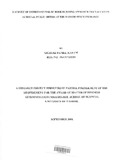| dc.description.abstract | There are three widely practiced approaches in pricing the initial public offerings (IPOs),
namely public offer, tender or auction and book-building. To understand the dynamics of
IPO pricing and the strategic information of prospectuses, it is important to recognize two
separate streams of scholarly research. The first body of research examines the issue of IPO
pricing, and whether or not new issues are regularly under priced or overpriced in the market.
Often an IPO, or even a routine listing, will not proceed without firm commitments from
institutional shareholders to purchase the designated shares. Book Building is basically a
capital issuance process used in IPO which aids price and demand discovery. It facilitates
adherence to the market fundamentals and foster transparency of the trading system used for
marketing a public offer. Major fluctuations in prices, oversubscription and rush for IPOS in
the recent times have been witnessed at the NSE and have been occasioned by high liquidity
levels necessitating a move to book building of equity shares of a company.
The Objectives of the Study were to seek perceptions on use of book building approach for
the valuation of IPOs at the NSE, to identify the techniques that companies employ in
valuation of IPOs at NSE and to identify the challenges associated with use of book building
approach for valuation of lPOs at NSE.This study will be of importance to investors, the
public, regulators, the NSE and the government in helping investors and the public to
redefine their existing policies and respond more proactively to their investments and
other similar situations arising within 4<thestock market. The research design used was a
survey of firms that have issued IPOs at NSE. Tofte population of study consisted of 55
companies which have issued IPOs in the Nairobi Stock Exchange, the Capital Markets
Authority, and in various Stock Brokers firms. The study largely utilized primary data
collected using open and closed ended questionnaires. The respondents were CEOs of
respective companies or regulators. The data collected was coded and analyzed using a
statistical analysis tool known as the Statistical Programme for Social Scientists (SPSS).,
From the findings the researcher concluded that the main advantage of the book building
approach is that individuals play a major role in price discovery and is well suited for
complex businesses that are either difficult to value or far removed fro The implication for
IPOs is that book building may be unnecessary in the future given the timely access the
internet offers to enumerable individual investors the public eye | en |

